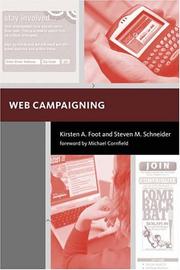| Listing 1 - 10 of 100 | << page >> |
Sort by
|
Book
Year: 1555 Publisher: Venetijs : Ex officina typographica M. Vascosani,
Abstract | Keywords | Export | Availability | Bookmark
 Loading...
Loading...Choose an application
- Reference Manager
- EndNote
- RefWorks (Direct export to RefWorks)
Book
Year: 1555 Publisher: Venetijs : Ex officina typographica M. Vascosani,
Abstract | Keywords | Export | Availability | Bookmark
 Loading...
Loading...Choose an application
- Reference Manager
- EndNote
- RefWorks (Direct export to RefWorks)
Multi
ISBN: 951765328X Year: 2006 Publisher: Åbo Åbo akademis förlag
Abstract | Keywords | Export | Availability | Bookmark
 Loading...
Loading...Choose an application
- Reference Manager
- EndNote
- RefWorks (Direct export to RefWorks)
Elections --- Internet in political campaigns --- Political culture

ISBN: 1413487637 Year: 2005 Publisher: Philadelphia (Pa.) Xlibris
Abstract | Keywords | Export | Availability | Bookmark
 Loading...
Loading...Choose an application
- Reference Manager
- EndNote
- RefWorks (Direct export to RefWorks)
Book
ISBN: 9782757423646 2757423649 Year: 2018 Publisher: Villeneuve-d'Ascq: Presses universitaires du Septentrion,
Abstract | Keywords | Export | Availability | Bookmark
 Loading...
Loading...Choose an application
- Reference Manager
- EndNote
- RefWorks (Direct export to RefWorks)
Internet in political campaigns --- Elections --- Political participation --- Information technology
Book
ISBN: 0190231912 9780190231910 9780190231927 0190231920 Year: 2015 Publisher: Oxford: New York: Oxford university press,
Abstract | Keywords | Export | Availability | Bookmark
 Loading...
Loading...Choose an application
- Reference Manager
- EndNote
- RefWorks (Direct export to RefWorks)
Political campaigns --- Internet in political campaigns --- Political participation --- Citizenship
Book
ISBN: 1283914417 353119819X Year: 2013 Publisher: Wiesbaden : Springer VS,
Abstract | Keywords | Export | Availability | Bookmark
 Loading...
Loading...Choose an application
- Reference Manager
- EndNote
- RefWorks (Direct export to RefWorks)
Der Online-Wahlkampf 2009 – mit hohen Erwartungen versehen und kontrovers diskutiert. Britta Rottbeck analysiert die Aktivitäten im Speziellen der Volksparteien 2009 und zeigt Herausforderungen und Lösungsansätze für die Akteure auf. Im Mittelpunkt der Online-Umfrage und der Experteninterviews stehen die unterschiedlichen Akteure sowie die zahlreichen Kampagnenziele – Partizipation, Mobilisierung, Information etc. Als Grundlage entwickelt die Autorin die digital zentrierte Kampagne, die als Analyseinstrument von Online-Kampagnen dient.
Social sciences. --- Social Sciences, general. --- Internet in political campaigns
Book
ISBN: 9782353410101 Year: 2007 Publisher: Paris Max Milo
Abstract | Keywords | Export | Availability | Bookmark
 Loading...
Loading...Choose an application
- Reference Manager
- EndNote
- RefWorks (Direct export to RefWorks)
Internet in political campaigns --- Political campaigns --- Presidential candidates --- Presidents --- Election
Book
ISBN: 090043290X Year: 2001 Publisher: London Hansard
Abstract | Keywords | Export | Availability | Bookmark
 Loading...
Loading...Choose an application
- Reference Manager
- EndNote
- RefWorks (Direct export to RefWorks)
Internet in political campaigns --- Presidents --- Election --- Computer network resources

ISBN: 9780262256148 0262256142 0262062585 9780262062589 0262562200 9780262562201 Year: 2006 Publisher: Cambridge, MA London MIT Press
Abstract | Keywords | Export | Availability | Bookmark
 Loading...
Loading...Choose an application
- Reference Manager
- EndNote
- RefWorks (Direct export to RefWorks)
The use of the Web in U.S. political campaigns has developed dramatically over the course of the last several election seasons. In Web Campaigning, Kirsten Foot and Steven Schneider examine the evolution of campaigns' Web practices, based on hundreds of campaign Web sites produced by a range of political actors during the U.S. elections of 2000, 2002, and 2004. Their developmental analyses of how and why campaign organizations create specific online structures illuminates the reciprocal relationship between these production practices and the structures of both the campaign organization and the electoral arena. This practice-based approach and the focus on campaigns as Web producers make the book a significant methodological and theoretical contribution to both science and technology studies and political communication scholarship. Foot and Schneider explore the inherent tension between the desire of campaigns to maintain control over messages and resources and the generally decentralizing dynamic of Web-based communication. They analyze specific strategies by which campaigns mitigate this, examining the ways that the production techniques, coproducing Web content, online-offline convergence, and linking to other Web sites mediate the practices of informing, involving, connecting, and mobilizing supporters. Their conclusions about the past decade's trajectory of Web campaigning point the way to a political theory of technology and a technologically grounded theory of electoral politics. A digital installation available on the web illustrates core concepts discussed in the text of the book with examples drawn from archived campaign Web sites. Users have the opportunity to search these concepts in the context of fully operational campaign sites, recreating the Web experience of users during the election periods covered in the book.
Internet in political campaigns --- Political campaigns --- Computer network resources
| Listing 1 - 10 of 100 | << page >> |
Sort by
|

 Search
Search Feedback
Feedback About UniCat
About UniCat  Help
Help News
News